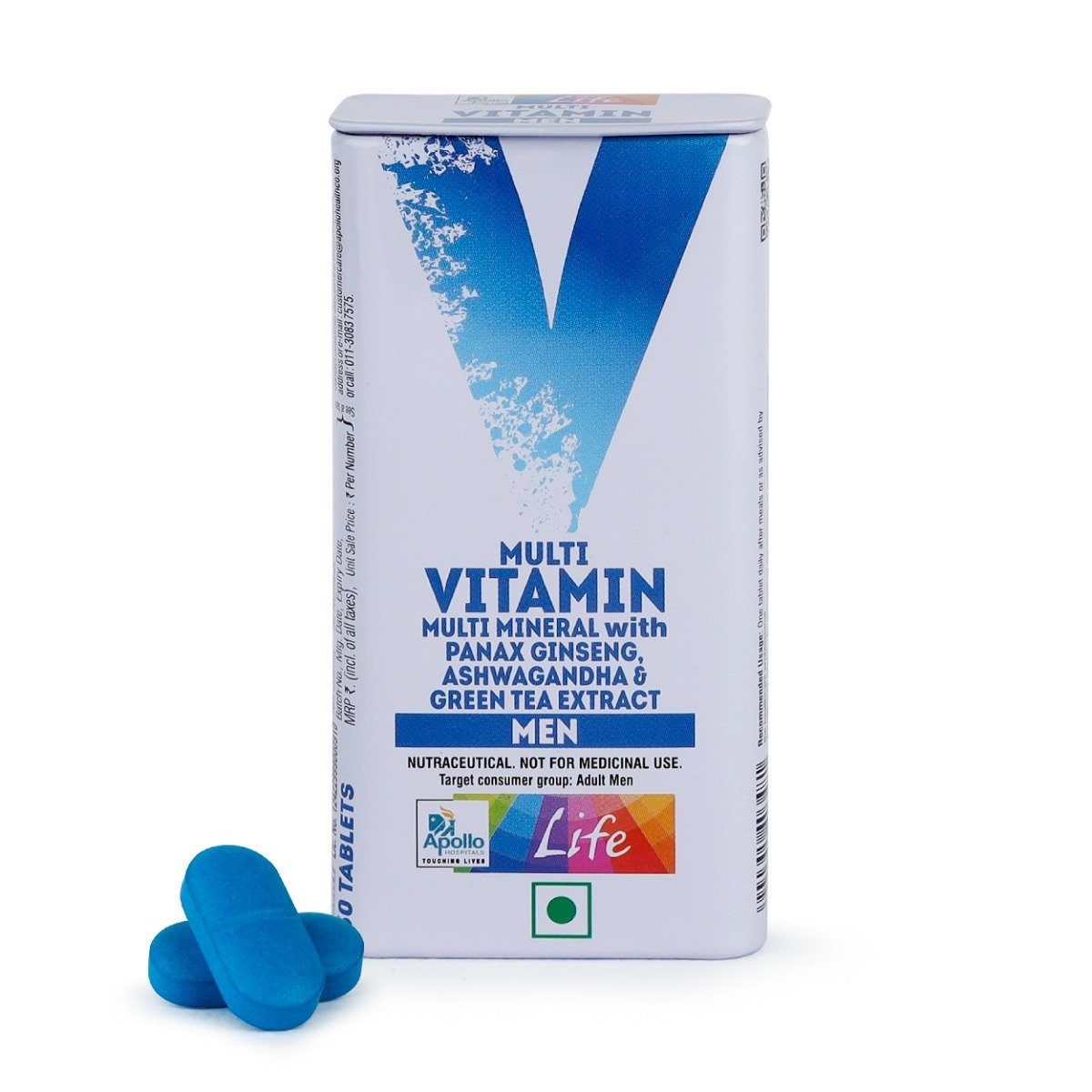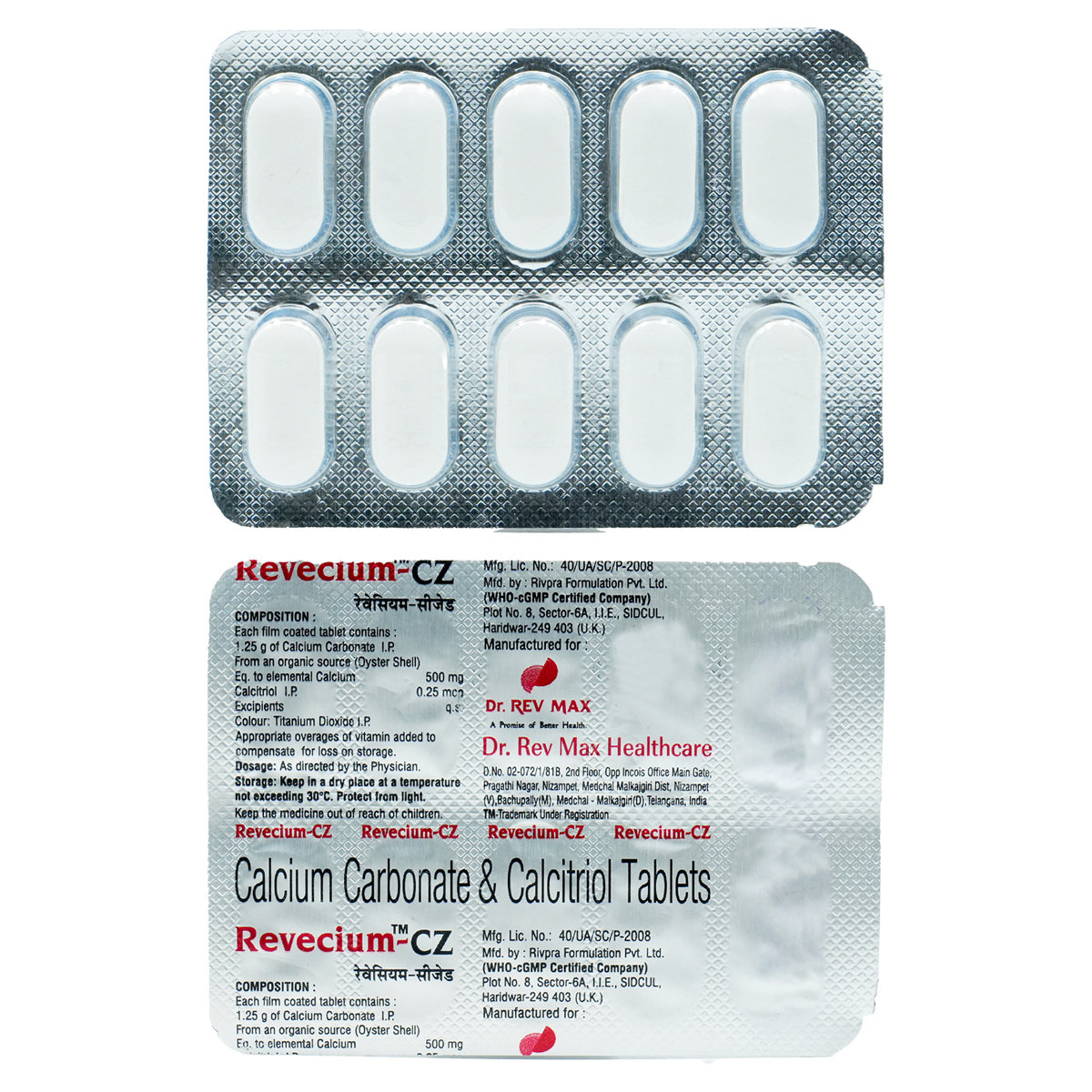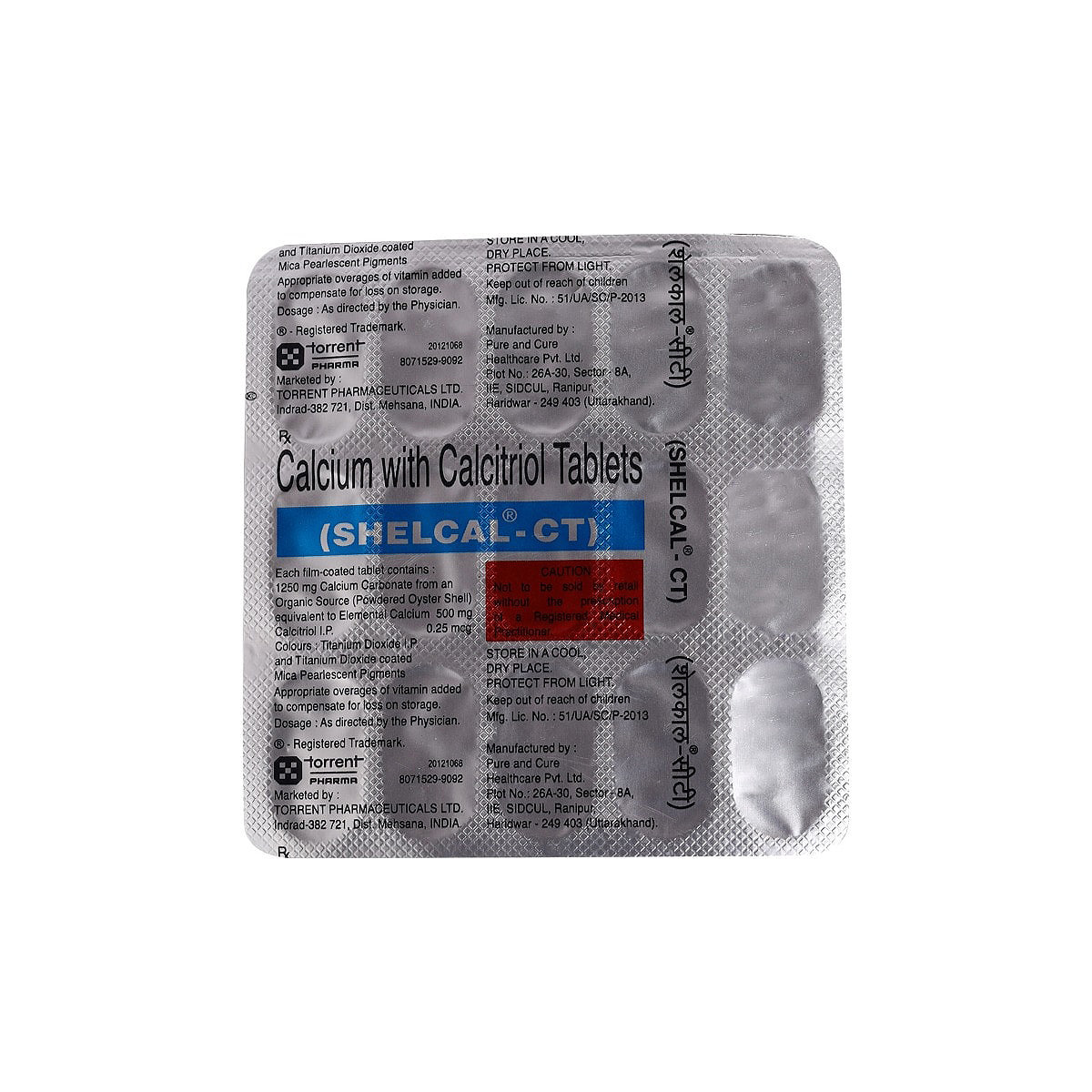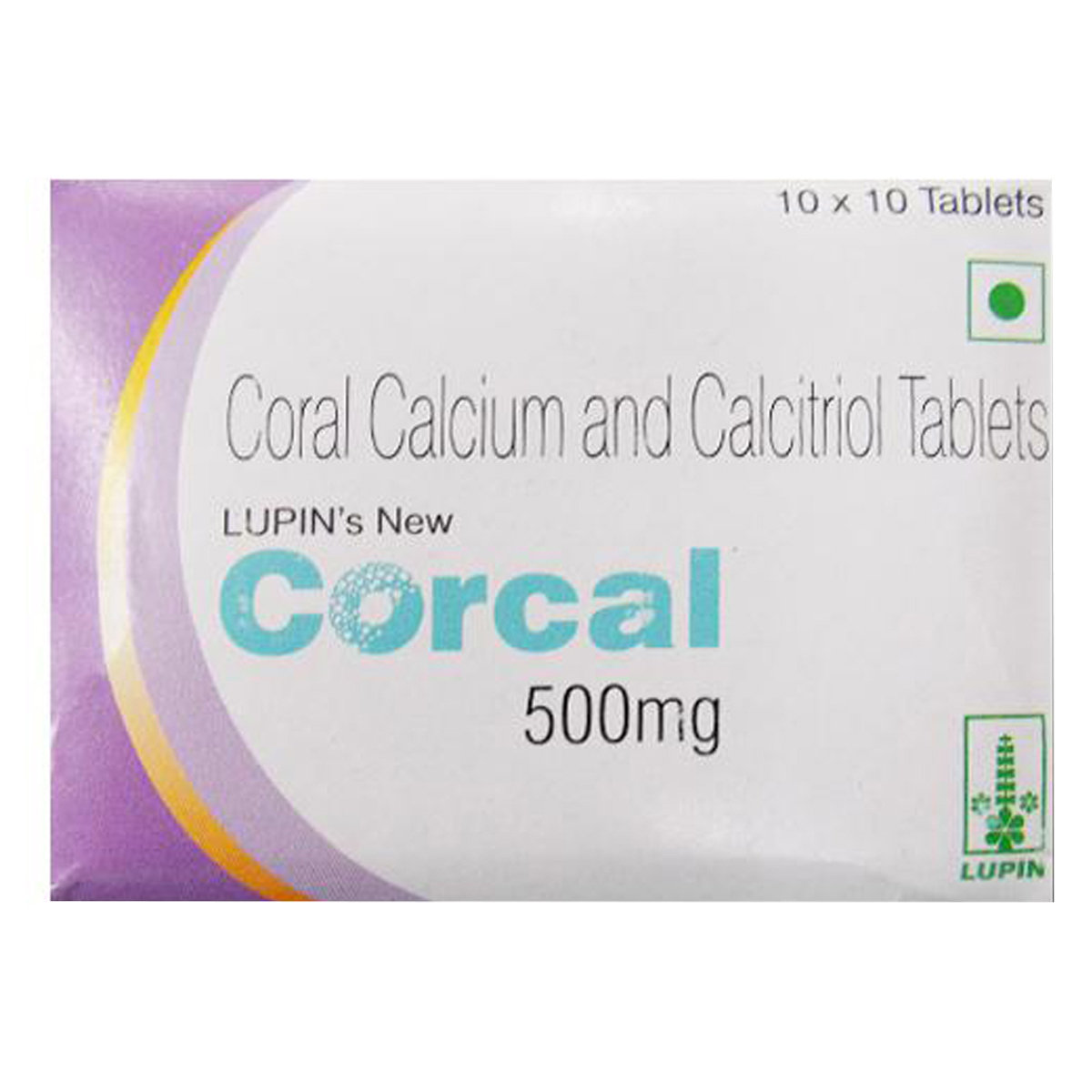Oxycal-CT Tablet 10's
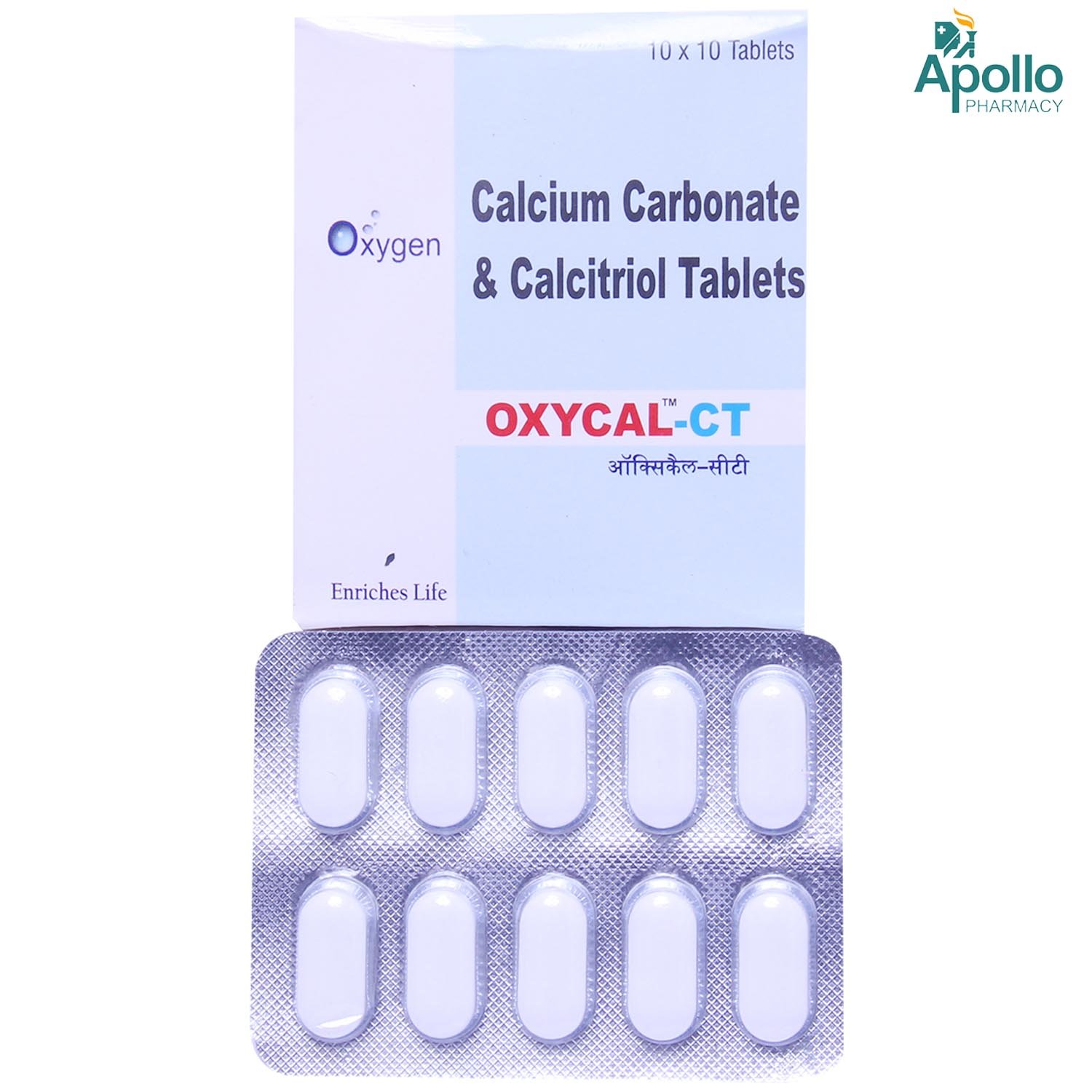
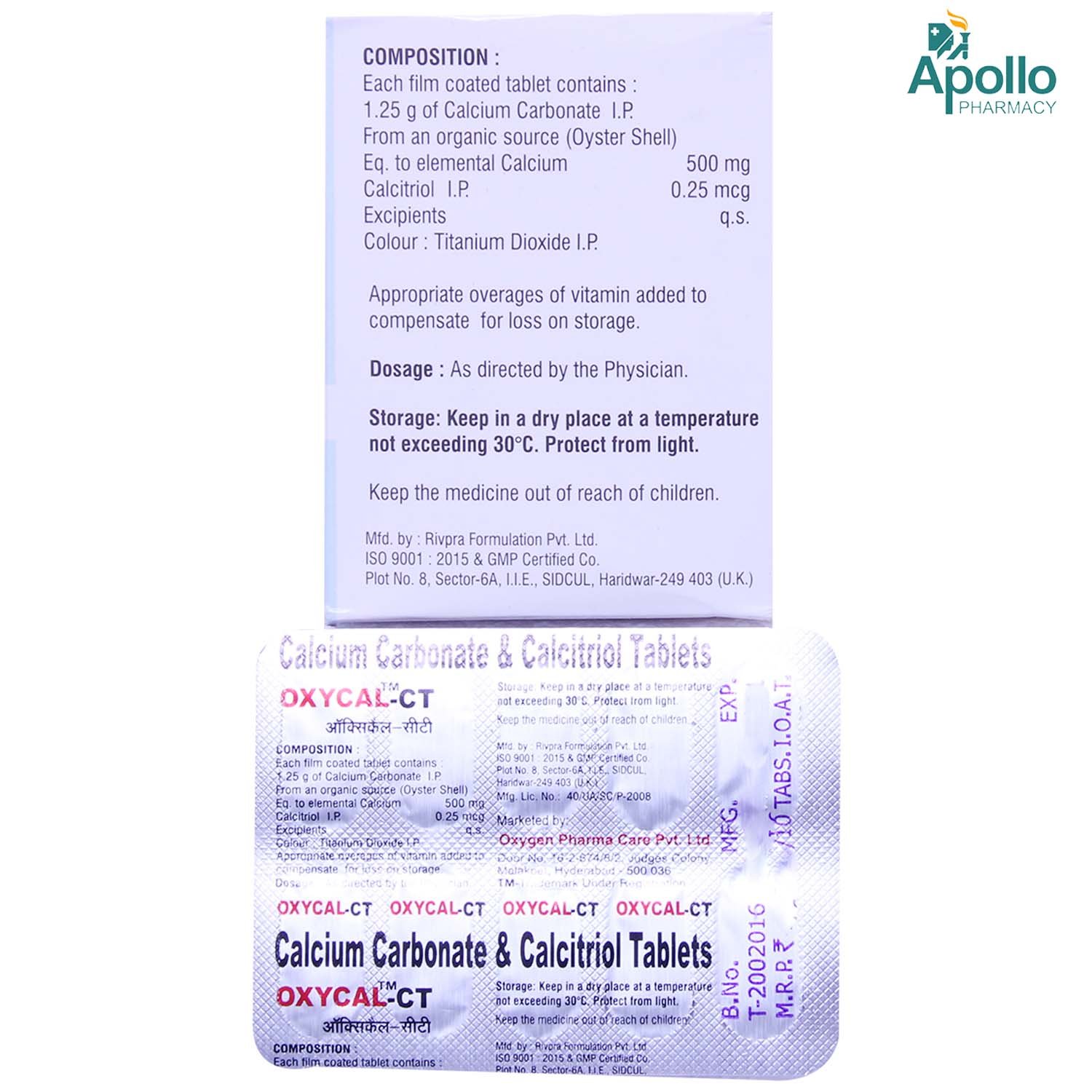
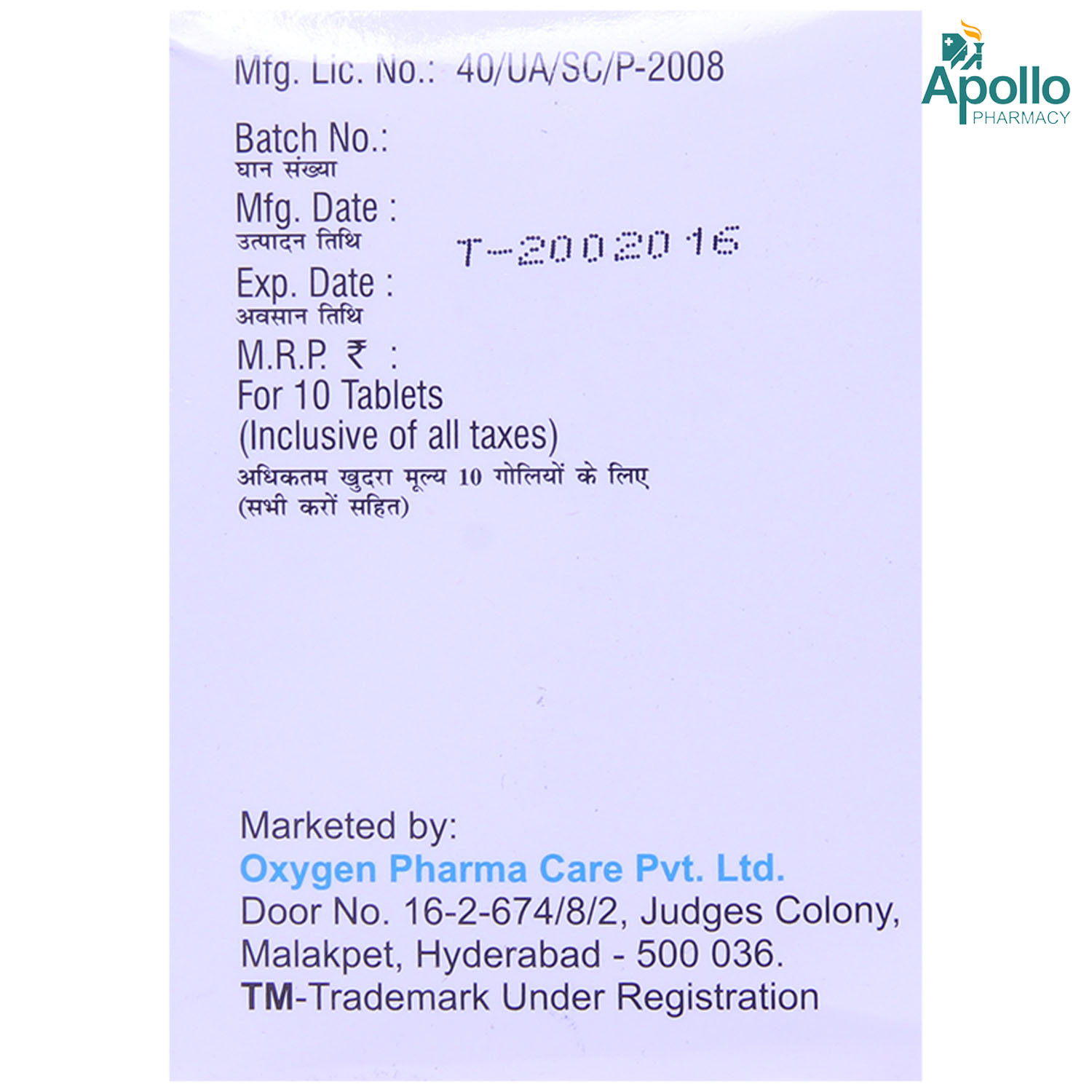



MRP ₹117
(Inclusive of all Taxes)
₹15.8 Cashback (15%)
About Oxycal-CT Tablet
Oxycal-CT Tablet belongs to the class of 'vitamins,' primarily used to treat various conditions caused by low calcium levels in the body like Vitamin D deficiency, osteoporosis (weak and brittle bones), hypoparathyroidism (a condition in which parathyroid glands make low levels of calcium in the body), latent tetany (a muscle disease with low blood calcium levels), and rickets or osteomalacia (softening or deforming of bones due to lack of calcium).
Oxycal-CT Tablet consists of calcium and calcitriol (vitamin D). Calcium is a mineral that is used to prevent or treat a calcium deficiency. It provides essential nutrients to maintain bone formation. Calcitriol is a synthetic form of vitamin D that helps maintain blood calcium and phosphorus levels and mineralization of bone.
Oxycal-CT Tablet is likely safe to use. In some cases, it may cause side effects like constipation and stomach upset. These side effects do not require medical attention and gradually resolve over time. However, if the side effects persist or worsen, please consult a doctor.
Let your doctor know if you are using any other medicine, or herbal products before starting Oxycal-CT Tablet . Please inform your doctor if you have hypercalcemia (high calcium levels), hypervitaminosis D (high vitamin D levels), malabsorption syndrome (difficulty absorbing nutrition from food), low levels of bile, and phosphate imbalance before starting Oxycal-CT Tablet . If you are pregnant or breastfeeding, consult your doctor before taking Oxycal-CT Tablet .
Country of origin
Manufacturer/Marketer address
Online payment accepted

Secure Payment

India's Most Trusted Pharmacy

Genuine Products
Synonym :
Composition :
Manufacturer/Marketer :
Consume Type :
Return Policy :
Expires on or after :
Available Offers
Provide Delivery Location
About Oxycal-CT Tablet
Oxycal-CT Tablet belongs to the class of 'vitamins,' primarily used to treat various conditions caused by low calcium levels in the body like Vitamin D deficiency, osteoporosis (weak and brittle bones), hypoparathyroidism (a condition in which parathyroid glands make low levels of calcium in the body), latent tetany (a muscle disease with low blood calcium levels), and rickets or osteomalacia (softening or deforming of bones due to lack of calcium).
Oxycal-CT Tablet consists of calcium and calcitriol (vitamin D). Calcium is a mineral that is used to prevent or treat a calcium deficiency. It provides essential nutrients to maintain bone formation. Calcitriol is a synthetic form of vitamin D that helps maintain blood calcium and phosphorus levels and mineralization of bone.
Oxycal-CT Tablet is likely safe to use. In some cases, it may cause side effects like constipation and stomach upset. These side effects do not require medical attention and gradually resolve over time. However, if the side effects persist or worsen, please consult a doctor.
Let your doctor know if you are using any other medicine, or herbal products before starting Oxycal-CT Tablet . Please inform your doctor if you have hypercalcemia (high calcium levels), hypervitaminosis D (high vitamin D levels), malabsorption syndrome (difficulty absorbing nutrition from food), low levels of bile, and phosphate imbalance before starting Oxycal-CT Tablet . If you are pregnant or breastfeeding, consult your doctor before taking Oxycal-CT Tablet .
Uses of Oxycal-CT Tablet
Medicinal Benefits
Oxycal-CT Tablet is used to treat low blood calcium levels. It effectively treats various conditions caused by low calcium levels in the body like vitamin D deficiency, osteoporosis, hypoparathyroidism, latent tetany, and rickets or osteomalacia. Oxycal-CT Tablet consists of two medicines: Calcium (mineral) and Calcitriol (Vitamin D). Calcium is a mineral that is used to prevent or treat a calcium deficiency. It provides essential nutrients to maintain bone formation. Calcitriol is a steroid hormone produced in the skin when exposed to ultraviolet light or obtained from food sources. It helps maintain blood calcium and phosphorus levels and mineralization of bone.
Directions for Use
Side Effects of Oxycal-CT Tablet
- Constipation
- Stomach upset
- Nausea/vomiting
- Bone/muscle pain
- Fast or pounding heartbeat
- Headache
Drug Warnings
If you are allergic to Oxycal-CT Tablet or any other medicines, please tell your doctor. If you are pregnant or planning to become pregnant, it is advised to inform your doctor before using Oxycal-CT Tablet . Consult your doctor if you are pregnant or breastfeeding. Oxycal-CT Tablet is not recommended if you have hypercalcemia (high calcium levels), metastatic calcification (extra deposits of calcium in the body), hypervitaminosis D (high vitamin D levels), and malabsorption syndrome (difficulty absorbing nutrition from food). Inform your doctor before taking Oxycal-CT Tablet if you have any heart/kidney/liver/blood vessel diseases, kidney stones, sarcoidosis (growth of inflammatory cells in different parts of the body), Crohn's disease (inflammatory bowel disease), Whipple's disease (bacterial infection affecting joints and digestive system), achlorhydria (little or no stomach acid), low levels of bile, and phosphate imbalance. Oxycal-CT Tablet may contain sugar or sorbitol; hence caution should be taken in case of intolerance to sugars, diabetes, and phenylketonuria (increased levels of an amino acid called phenylalanine).
Drug Interactions
Drug-Drug Interactions: Oxycal-CT Tablet may interact with drugs treating high cholesterol levels (cholestyramine, colesevelam, colestipol), antibiotics (doxycycline, minocycline, ciprofloxacin, levofloxacin, penicillin, neomycin, and chloramphenicol), anti-cancer drugs (estramustine), drugs treating bone loss (alendronate sodium), hormone (levothyroxine), weight-loss drugs (orlistat), fits medicines (phenobarbital), mineral oils (paraffin), water pills (furosemide, ethacrynic acid), and heart-related medicines (digitoxin).
Drug-Food Interactions: Avoid or reduce caffeine intake, soft drinks, and alcohol, as they might inhibit calcium absorption.
Drug-Disease Interactions: Brief your doctor if your children have a medical history of allergic reactions, cardiovascular adverse effects, phosphate calcifications, cardiac contraction/conduction, malabsorption, renal dysfunction, sarcoidosis, arrhythmia, electrolyte imbalance, hypercalcemia, renal dysfunction, and hepatobiliary dysfunction.
Drug-Drug Interactions Checker List
- CHOLESTYRAMINE
- COLESEVELAM
- COLESTIPOL
- DOXYCYCLINE
- MINOCYCLINE
- CIPROFLOXACIN
- LEVOFLOXACIN
- PENICILLIN
- NEOMYCIN
- CHLORAMPHENICOL
- ESTRAMUSTINE
- ALENDRONATE SODIUM
- LEVOTHYROXINE
- ORLISTAT
- PHENOBARBITAL
- FUROSEMIDE
- ETHACRYNIC ACID
- DIGITOXIN
- PARAFFIN
Habit Forming
Diet & Lifestyle Advise
- Include dairy products like milk, yoghurt, cheese, or milk-based custard in children's diets.
- Eat daily a serving of broccoli, cabbage, spinach, and other green leafy vegetables.
- Include the best dietary sources of vitamin D, such as fish liver oils and vitamin D–fortified milk.
- Snack on calcium-rich nuts like Brazil nuts or almonds.
- Sprinkle sesame seeds over your food, vegetables, and salads. Sesame seeds are high in calcium.
- Avoid or reduce the intake of caffeine, soft drinks, and alcohol that inhibit calcium absorption.
- Replace the meat with tofu or tempeh for extra calcium in your children's meals.
Special Advise
Oxycal-CT Tablet may interfere with cholesterol tests. Hence please inform your doctor and laboratory staff that you are using Oxycal-CT Tablet before undergoing blood tests.
Disease/Condition Glossary
Vitamin D deficiency: When a person cannot get enough Vitamin D through food and exposure to sunlight, it leads to vitamin D deficiency. It often leads to thin, brittle, or misshapen bones.
Osteoporosis: Osteoporosis is a bone disease that weakens brittle bones by decreasing bone density.
Tetany: It is a disease condition caused due to low calcium levels (hypocalcemia) in the body that causes cramps and spasms in the hands, feet, and larynx (voice box).
Osteomalacia/Rickets: A disease caused by softening and weakening bones in children due to inadequate vitamin D.
Hypoparathyroidism: It is a disease characterized by low parathyroid hormone levels. This can cause low calcium levels and trigger tetany (muscle cramps, spasms, or tremors).
FAQs
Oxycal-CT Tablet consists of two vitamins: Calcium and Calcitriol (vitamin D). Calcium is a mineral used to prevent or treat a calcium deficiency. It provides essential nutrients to maintain bone formation. Calcitriol helps maintain blood calcium and phosphorus levels and mineralisation of bone.
Antacids may alter the absorption of Calcium from Oxycal-CT Tablet . Hence it is advised to take Oxycal-CT Tablet two hours before or four hours after taking antacids.
Oxycal-CT Tablet is used to treat low levels of calcium in the body. Hence it is not advised to use Oxycal-CT Tablet if you have hypercalcemia since higher calcium levels may lead to kidney stones and other effects.
Oxycal-CT Tablet can cause kidney stones due to excess calcium deposition when used for a prolonged period. Please consult your doctor before taking Oxycal-CT Tablet as a daily supplement if you have any kidney problems or a history of kidney stones.
Milk is considered to be the best source of calcium. You can take Oxycal-CT Tablet with milk.
Disclaimer
Customers Also Bought
Product Substitutes
Alcohol
Caution
Drinking alcohol can affect calcium absorption; hence, limit alcohol consumption while using Oxycal-CT Tablet .
Pregnancy
Caution
Consult your doctor if you are pregnant. Your doctor will weigh the potential risks and benefits before recommending this medicine.
Breast Feeding
Caution
Consult your doctor before taking Oxycal-CT Tablet if you are breastfeeding. Oxycal-CT Tablet can pass into the breast milk. If this medicine is used during breastfeeding, monitoring the serum calcium levels of the mother and the infant is required.
Driving
Not applicable
Oxycal-CT Tablet usually does not affect your ability to drive. However, if you experience any unmanageable side effects while using it, avoid driving or operating machinery.
Liver
Consult your doctor
Consult your doctor if you have any history of liver diseases before taking Oxycal-CT Tablet . Hepatic impairment/liver disease can alter the metabolism and therapeutic activity of certain Vitamin D forms.
Kidney
Consult your doctor
You should seek a doctor's advice before starting Oxycal-CT Tablet if you have kidney diseases like kidney stones or undergoing dialysis. Be cautious if you are undergoing dialysis to maintain adequate phosphorus levels and avoid ectopic calcification (calcium deposition).
Children
Consult your doctor
Please consult your doctor. Your doctor will recommend a suitable dose based on your child's age, body weight and condition.
Author Details
We provide you with authentic, trustworthy and relevant information
Uses of Oxycal-CT Tablet
Medicinal Benefits
Oxycal-CT Tablet is used to treat low blood calcium levels. It effectively treats various conditions caused by low calcium levels in the body like vitamin D deficiency, osteoporosis, hypoparathyroidism, latent tetany, and rickets or osteomalacia. Oxycal-CT Tablet consists of two medicines: Calcium (mineral) and Calcitriol (Vitamin D). Calcium is a mineral that is used to prevent or treat a calcium deficiency. It provides essential nutrients to maintain bone formation. Calcitriol is a steroid hormone produced in the skin when exposed to ultraviolet light or obtained from food sources. It helps maintain blood calcium and phosphorus levels and mineralization of bone.
Directions for Use
Drug Warnings
If you are allergic to Oxycal-CT Tablet or any other medicines, please tell your doctor. If you are pregnant or planning to become pregnant, it is advised to inform your doctor before using Oxycal-CT Tablet . Consult your doctor if you are pregnant or breastfeeding. Oxycal-CT Tablet is not recommended if you have hypercalcemia (high calcium levels), metastatic calcification (extra deposits of calcium in the body), hypervitaminosis D (high vitamin D levels), and malabsorption syndrome (difficulty absorbing nutrition from food). Inform your doctor before taking Oxycal-CT Tablet if you have any heart/kidney/liver/blood vessel diseases, kidney stones, sarcoidosis (growth of inflammatory cells in different parts of the body), Crohn's disease (inflammatory bowel disease), Whipple's disease (bacterial infection affecting joints and digestive system), achlorhydria (little or no stomach acid), low levels of bile, and phosphate imbalance. Oxycal-CT Tablet may contain sugar or sorbitol; hence caution should be taken in case of intolerance to sugars, diabetes, and phenylketonuria (increased levels of an amino acid called phenylalanine).
Therapeutic Class
Drug-Drug Interactions
Drug-Drug Interactions
Login/Sign Up
Co-administration of Metolazone with Oxycal-CT Tablet can cause blood calcium levels to become too high.
How to manage the interaction:
Although there is an interaction, Oxycal-CT Tablet can be taken with metolazone if prescribed by the doctor. Consult the doctor if you experience symptoms such as dizziness, drowsiness, weakness, lethargy, headache, nausea, vomiting, or seizures. Do not discontinue the medication without consulting a doctor.
Co-administration of Ergocalciferol and Oxycal-CT Tablet are forms of vitamin D, and taking too much vitamin D may lead to toxic effects related to increased calcium levels in the blood and urine.
How to manage the interaction:
Co-administration of Ergocalciferol with Oxycal-CT Tablet can lead to an interaction, it can be taken if advised by a doctor. Consult the prescriber if you experience symptoms of vitamin D intoxication such as weakness, fatigue, headache, vertigo, drowsiness, ringing in the ears, loss of appetite, nausea, vomiting, constipation, dry mouth, metallic taste, muscle pain, bone pain, muscle incoordination, and low muscle tone. Do not discontinue the medication without consulting a doctor.
Co-administration of Rifapentine with Oxycal-CT Tablet may decrease the effects of Oxycal-CT Tablet.
How to manage the interaction:
Although there is an interaction, Oxycal-CT Tablet can be taken with Rifapentine if prescribed by the doctor. The doctor may recommend dose adjustment or special tests to use both medicines safely. Do not discontinue the medication without consulting a doctor.
Co-administration of Isoniazid with Oxycal-CT Tablet may decrease the effects of Oxycal-CT Tablet.
How to manage the interaction:
Although there is an interaction, Oxycal-CT Tablet can be taken with isoniazid if prescribed by the doctor. Do not stop using any medications without talking to a doctor. Do not discontinue the medication without consulting a doctor.
Co-administration of Paricalcitol and Oxycal-CT Tablet are forms of vitamin D, and taking too much vitamin D may lead to toxic effects related to excessive calcium levels in the blood and urine.
How to manage the interaction:
Concomitant use of Paricalcitol with Oxycal-CT Tablet can lead to an interaction, it can be taken if advised by a doctor. Consult the prescriber if you experience symptoms of vitamin D intoxication such as weakness, fatigue, headache, vertigo, drowsiness, ringing in the ears, loss of appetite, nausea, vomiting, constipation, dry mouth, metallic taste, muscle pain, bone pain, muscle incoordination, and low muscle tone. Do not discontinue the medication without consulting a doctor.
Taking Oxycal-CT Tablet with Fosphenytoin can reduce the levels and efficacy of Oxycal-CT Tablet.
How to manage the interaction:
Taking Oxycal-CT Tablet with Fosphenytoin together can possibly result in an interaction, but it can be taken if a doctor has advised it. If you notice any symptoms of sudden dizziness, weakness, chest pain or pressure, abnormal body movements, uncontrollable eye movements, itching, burning, or tingling sensation, it's important to contact a doctor right away. Do not stop using any medications without a doctor's advice. Do not discontinue the medication without consulting a doctor.
Co-administration of Oxycal-CT Tablet with Carbamazepine may decrease the effects of Oxycal-CT Tablet.
How to manage the interaction:
Although there is an interaction, Oxycal-CT Tablet can be taken with Carbamazepine if prescribed by the doctor. However, if you experience any unusual symptoms contact your doctor immediately. Do not stop using any medications without first talking to your doctor.
Co-administration of Doxercalciferol and Oxycal-CT Tablet are forms of vitamin D, and taking too much vitamin D may lead to toxic effects related to increased calcium levels in the blood and urine.
How to manage the interaction:
Taking Doxercalciferol with Oxycal-CT Tablet can lead to an interaction, it can be taken if advised by a doctor. Consult the prescriber if you experience symptoms of vitamin D intoxication such as weakness, fatigue, headache, vertigo, drowsiness, ringing in the ears, loss of appetite, nausea, vomiting, constipation, dry mouth, metallic taste, muscle pain, bone pain, muscle incoordination, and low muscle tone. Do not discontinue the medication without consulting a doctor.
Co-administration of Orlistat with Oxycal-CT Tablet may reduce the levels of Oxycal-CT Tablet which can lead to low treatment outcomes.
How to manage the interaction:
Although there is an interaction, Oxycal-CT Tablet can be taken with Orlistat when prescribed by the doctor. Do not discontinue any medications without consulting a doctor.
Co-administration of Oxycal-CT Tablet with Digitoxin may increase the risk or severity of digitoxin toxicity and irregular heart rhythm.
How to manage the interaction:
Although there is an interaction, Oxycal-CT Tablet can be taken with Digitoxin if prescribed by the doctor. Consult the prescriber if you experience symptoms that could indicate high blood calcium, such as weakness, fatigue, headache, dizziness, drowsiness, ringing in the ears, loss of appetite, nausea, vomiting, constipation, dry mouth, a metallic taste in the mouth, bone or muscle pain, incoordination, frequent urination, and weight loss. Also, seek medical attention if you experience symptoms of digitoxin toxicity, such as blurred vision, slow pulse, or irregular heartbeats. Do not discontinue the medication without consulting a doctor.
Drug-Drug Interactions Checker List
- CHOLESTYRAMINE
- COLESEVELAM
- COLESTIPOL
- DOXYCYCLINE
- MINOCYCLINE
- CIPROFLOXACIN
- LEVOFLOXACIN
- PENICILLIN
- NEOMYCIN
- CHLORAMPHENICOL
- ESTRAMUSTINE
- ALENDRONATE SODIUM
- LEVOTHYROXINE
- ORLISTAT
- PHENOBARBITAL
- FUROSEMIDE
- ETHACRYNIC ACID
- DIGITOXIN
- PARAFFIN
Diet & Lifestyle Advise
- Include dairy products like milk, yoghurt, cheese, or milk-based custard in children's diets.
- Eat daily a serving of broccoli, cabbage, spinach, and other green leafy vegetables.
- Include the best dietary sources of vitamin D, such as fish liver oils and vitamin D–fortified milk.
- Snack on calcium-rich nuts like Brazil nuts or almonds.
- Sprinkle sesame seeds over your food, vegetables, and salads. Sesame seeds are high in calcium.
- Avoid or reduce the intake of caffeine, soft drinks, and alcohol that inhibit calcium absorption.
- Replace the meat with tofu or tempeh for extra calcium in your children's meals.
Habit Forming
Side Effects of Oxycal-CT Tablet
- Constipation
- Stomach upset
- Nausea/vomiting
- Bone/muscle pain
- Fast or pounding heartbeat
- Headache
Special Advise
Oxycal-CT Tablet may interfere with cholesterol tests. Hence please inform your doctor and laboratory staff that you are using Oxycal-CT Tablet before undergoing blood tests.
Disease/Condition Glossary
Vitamin D deficiency: When a person cannot get enough Vitamin D through food and exposure to sunlight, it leads to vitamin D deficiency. It often leads to thin, brittle, or misshapen bones.
Osteoporosis: Osteoporosis is a bone disease that weakens brittle bones by decreasing bone density.
Tetany: It is a disease condition caused due to low calcium levels (hypocalcemia) in the body that causes cramps and spasms in the hands, feet, and larynx (voice box).
Osteomalacia/Rickets: A disease caused by softening and weakening bones in children due to inadequate vitamin D.
Hypoparathyroidism: It is a disease characterized by low parathyroid hormone levels. This can cause low calcium levels and trigger tetany (muscle cramps, spasms, or tremors).

Have a query?
Buy best Health & Nutrition products by
Others
AYUR
HIMALAYAN ORGANICS
WELLBEING NUTRITION
HEALTHVIT
APOLLO LIFE
HORLICKS
PURE NUTRITION
GNC
HAPPILO
KELLOGG S
APOLLO PHARMACY
ENSURE
Optimum Nutrition
SWISSE
Dabur
FAST&UP
ZANDU
MUSCLEBLAZE
Muscletech
SUGAR FREE
COMPLAN
KAPIVA
PROHANCE
QNT
Pediasure
THE VITAMIN COMPANY
VOGUE WELLNESS
CENTRUM
CUREVEDA
GLUCON-D
PROTINEX
BAIDYANATH
Millet Marvels
OZIVA
LION
ORIGIN
PENTASURE
RITEBITE
THE GOOD BUG
AYUSH KALP
RASAYANAM
MANNA
TRUE ELEMENTS
BOURNVITA
EQUAL
HIMALAYA
MY FITNESS
CALCIMAX
PATANJALI
SWADESHI
TONG GARDEN
BEAUTYWISE
ISOPURE
HEALTHYR-U
NESTLE RESOURCE
SAFFOLA
YOGABAR
B-PROTIN
BODYWELL
PINTOLA
Power Gummies
ULTRA D3
FITSPIRE
GALACT
GRD
INDIA HEMP ORGANICS
JIVA
NEUHERBS
NUTRASWISS
INJA
Performance Inspired
REVITAL
THREPTIN
Bolas
CELEVIDA
ENERZAL
ESSENTIAL
IN YOU
ORGANIC INDIA
PRO-PL
QUAKER
WEST COAST
BOOST
D-PROTIN
ENDURA MASS
ESPERER
FRESUBIN
GOFIGURE
HEALTHKART
OURDAILY
PROLYTE
SRI SRI TATTVA
VIVAMOM
Amocare
BAIDYANATH VANSAAR
BASIC AYURVEDA
BLACKMORES
BOLD CARE
ECOPROT
Vlado Sky Enterprise Pvt Ltd
Abbott India Ltd
Sun Pharmaceutical Industries Ltd
Apollo Healthco Limited
Zydus Healthcare Ltd
Macleods Pharmaceuticals Ltd
West Coast Pharmaceuticals Pvt Ltd
Intas Pharmaceuticals Ltd
Mankind Pharma Pvt Ltd
Meyer Organics Pvt Ltd
Emcure Pharmaceuticals Ltd
Lupin Ltd
Alkem Laboratories Ltd
Nutritionalab Pvt Ltd
Eris Life Sciences Ltd
Akumentis Healthcare Ltd
British Biologicals
La Renon Healthcare Pvt Ltd
Cipla Ltd
Micro Labs Ltd
Zuventus Healthcare Ltd
Torrent Pharmaceuticals Ltd
Pharmed Ltd
Dr Reddy's Laboratories Ltd
Modi Mundipharma Pvt Ltd
Corona Remedies Pvt Ltd
Hindustan Unilever Ltd
Indchemie Health Specialities Pvt Ltd
Apex Laboratories Pvt Ltd
Koye Pharmaceuticals Pvt Ltd
Leeford Healthcare Ltd
Bioceutics Inc
East West Pharma India Pvt Ltd
Alniche Life Sciences Pvt Ltd
FDC Ltd
Alembic Pharmaceuticals Ltd
Aristo Pharmaceuticals Pvt Ltd
DR Johns Lab Pharma Pvt Ltd
Herbs Nutriproducts Pvt Ltd
Guardian Healthcare Services Pvt Ltd
Vasu Organics Pvt Ltd
Pulse Pharmaceuticals
Fourrts India Laboratories Pvt Ltd
TTK Healthcare Ltd
Raptakos Brett & Co Ltd
USV Pvt Ltd
Glanbia Performance Nutrition India Pvt Ltd
Morepen Laboratories Ltd
Innovcare Life Sciences Pvt Ltd
Linux Laboratories Pvt Ltd
Troikaa Pharmaceuticals Ltd
Cadila Pharmaceuticals Ltd
Bright Lifecare Pvt Ltd
Wockhardt Ltd
Sanofi India Ltd
Primus Remedies Pvt Ltd
Zydus Cadila
Kellogg India Pvt Ltd
Tablets India Ltd
Indoco Remedies Ltd
Medley Pharmaceuticals Ltd
Overseas Health Care Pvt Ltd
Procter & Gamble Health Ltd
Shri Balaji Overseas
Dabur India Ltd
Ordain Health Care Global Pvt Ltd
Systopic Laboratories Pvt Ltd
Ajanta Pharma Ltd
Daris Biocare
Health & Happiness (H&H) Trading India Pvt Ltd
Hexagon Nutrition Pvt Ltd
Nutricia International Pvt Ltd
Zee Laboratories Ltd
Aareen Healthcare Pvt Ltd
Aeronutrix Sports Products Pvt Ltd
Emami Ltd
Radicool Pharmaceuticals Pvt Ltd
Wanbury Ltd
Biovitamins Pvt Ltd
Cadila Healthcare Ltd
Esmatrix Life Sciences Pvt Ltd
Ipca Laboratories Ltd
Klm Laboratories Pvt Ltd
Lloyd Healthcare Pvt Ltd
Sain Medicaments Pvt Ltd
Septalyst Lifesciences Pvt Ltd
Tas Med India Pvt Ltd
Wallace Pharmaceuticals Pvt Ltd
Biorex Healthcare Pvt Ltd
Elbrit Life Sciences Pvt Ltd
Levin Life Sciences Pvt Ltd
Panacea Biotec Ltd
Adret Retail Pvt Ltd
Cipla Health Ltd
Delcure Life Sciences Ltd
Femura Pharmaceuticals Pvt Ltd
Gladstone Pharma India Pvt Ltd
GlaxoSmithKline Consumer Healthcare Ltd
Kepler Healthcare Pvt Ltd
Ronyd Healthcare Pvt Ltd
SPECIALITY SUPPLEMENT
CALCIUM
IRON
VITAMIN D
COLLAGEN
VITAMIN B12
VITAMIN C
FISH OIL OMEGA
VITAMIN B
MULTIVITAMIN
Adult Nutrition Drink
ZINC
SEXUAL HEALTH SUPPLEMENT
WHEY PROTEIN
Kids Nutrition Drink
VITAMIN B9
ENERGY DRINK
SPECIALITY NUTRITION DRINK
DRY FRUIT
HERBAL JUICE
VITAMIN E
Prebiotic & Probiotic
ORS
SUGAR SUBSTITUTE
WOMEN & MOTHER NUTRITION DRINK
Chyawanprash
MAGNESIUM
Protein Bar
BREAKFAST CEREAL
Protein Powder
BIOTIN
DIABETIC NUTRITION DRINK
Honey
WEIGHT LOSS
Fat Burner
PLANT PROTEIN POWDER
VITAMIN B1
Apple Cider Vinegar
MELATONIN
APPETITE STIMULANT
Meal Replacement
Peanut Butter
AMINO ACID
Flax seed Oil
INFUSION TEA
NUT & SEED
Ashwagandha
Instant Food
OATS
Olive Oil
Mass Gainer
Pre Workout
CURCUMIN
POTASSIUM
VITAMIN A
DISKETTE
L-Carnitine
Cod Liver Oil
CREATINE
MILLETS & CEREALS
VITAMIN B6
ARGININE
COENZYME Q10
Shilajit
Appetite Suppressant
Chromium
MILK THISTLE
Glutathione
VITAMIN B2
VITAMIN K
L-Glutamine
MORINGA
GARCINIA CAMBOGIA
GREEN TEA
SPIRULINA
ALPHA-LIPOIC ACID
GLUCOSAMINE
GOKSHURA
BCAA Protein Powder
GILOY
NEEM
SAFFRON
SELENIUM
TRIPHALA
Tulsi
VITAMIN B3
VITAMIN B5
Brahmi
CANDIES
FRUIT JUICE
Face Gel
Specialty Supplements
WEIGHT GAINER
WHEAT GRASS POWDER







